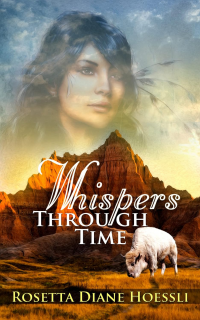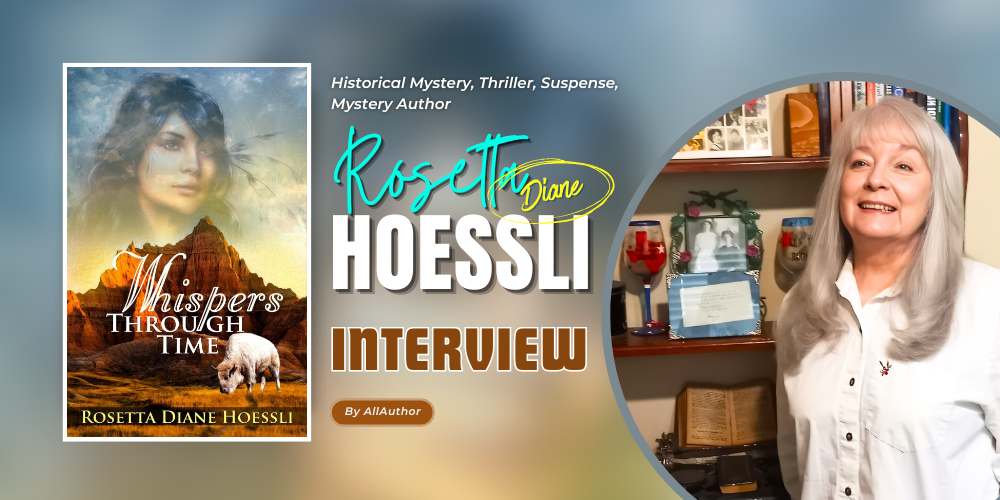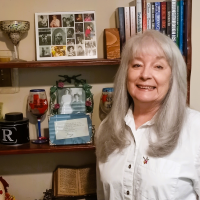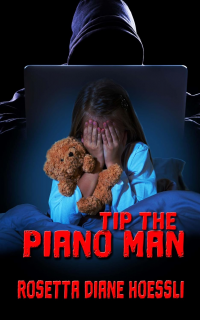Genre:
Historical Mystery Thriller Suspense Mystery- Country: United States
- Books: 2
- Profession: Author
- Born: 22 February
- Member Since: Sep 2023
- Profile Views: 5,362
- Followers: 179
I've been writing since I was about 6 years old. As the only daughter of a military father and a homemaker mother, making up stories was a way to entertain myself while traveling from duty station to duty station.
But my love of writing became a real obsession after I read EXODUS by Leon Uris. His characters were deep and profound, and his setting of Israel after WWII drew me in like nothing I'd ever read before. I knew writing was what I had to try to do and I've been doing it ever since.
The Wild Rose Press published my historical/fantasy novel, WHISPERS THROUGH TIME, in 2021, and my mystery/suspense novel, TIP THE PIANO MAN, in May, 2024. I'm currently working on Book Two of my WHISPERS THROUGH TIME series, tentatively titled JOURNEY OF THE HEART.
Rosetta Diane Hoessli's Books
Stay in the loop on books by Rosetta Diane Hoessli. See upcoming and best-selling books by the author here. You'll also find the deals on books by Rosetta Diane Hoessli.
** Please note that the information or price displayed here may not be the updated. Make sure to double-check the latest book price before buying books.
** Also, there might be other books by Rosetta Diane Hoessli not listed on AllAuthor.
| Book |
|---|
Whispers Through Timeby Rosetta Diane HoessliPublish: Aug 16, 2021Series: Whispers Through Time SeriesHistorical Mystery |
Rosetta Diane Hoessli's Series in Order
It's exciting to find a book series to follow! Discover the whole new world of book series created by Rosetta Diane Hoessli.
** Also, there might be other book series by Rosetta Diane Hoessli not listed on AllAuthor.
Whispers Through Time Series
1
Rosetta Diane Hoessli's Awards and Achievements
-


Third Place AllAuthor Cover of the Month
2024Whispers Through Time
award
Rosetta Diane Hoessli has earned excellence awards over time. Here is the glimpse of the accolades clinched by the author.
Rosetta Diane Hoessli Interview On 21, Aug 2024
 "Rosetta Diane Hoessli has been passionate about writing since the age of six. Her love of writing transformed into a true obsession after reading "Exodus" by Leon Uris, whose profound characters and post-WWII Israeli setting captivated her like nothing before. This inspiration led her to pursue writing as a lifelong endeavor. Her historical fantasy novel, "Whispers Through Time," was published by The Wild Rose Press in 2021."
"Rosetta Diane Hoessli has been passionate about writing since the age of six. Her love of writing transformed into a true obsession after reading "Exodus" by Leon Uris, whose profound characters and post-WWII Israeli setting captivated her like nothing before. This inspiration led her to pursue writing as a lifelong endeavor. Her historical fantasy novel, "Whispers Through Time," was published by The Wild Rose Press in 2021."
We had a new house (or an old one, depending on the duty station) every two years or so, and that meant I had to create a new sleeping area (not always a bedroom). So, I used to imagine that I had been in a wagon train with my family, we had been attacked by Indians, and I was the only survivor. I stumbled away from the carnage into the woods, or a canyon, or some other place where I could hide, and I came upon a cabin. When I went inside, it was empty and dusty and neglected, but other than that, it didn’t look too bad. So, I’d set to work, cleaning and redecorating, until I had created a whole new look for my little sleeping area or bedroom. This imagined tale got me through a lot of duty stations. To this day, if my house needs a good spring cleaning, I rely on this imaginary story for motivation.
Whenever my father had to drive to a new duty station, my parents made me a wonderful bed in the back of our station wagon (which we drove for years), and I’d read for miles and miles. I went through all the Nancy Drew Mysteries, The Bobbsey Twins, and The Hardy Boys as we covered this country. At night, I’d fall asleep imagining I was in the back of a covered wagon. I don’t know why; a mental picture of covered wagons has always just called to me. Again, to this day, if I can’t sleep, I use an imaginary covered wagon and I’m out like a light.
Finally, I have an insatiable wanderlust, which I’m sure comes from that background, even though I’ve lived in San Antonio, Texas (and in the same house with the same husband!) for more than 50 years. My favorite areas are deserts and canyons, anything out west. I like a lot of sky.
Did any of those early ideas evolve into your published works?I’ve never even thought about that, but, yes, I think they did. The very first novel I ever completed (and I’m fixing to incorporate some of it into my work-in-progress) was set in the Llano Estacado portion of north Texas. It was about Comanche Indians who kidnapped a white child in the 1840’s and a Texas Ranger who helps the child’s mother locate her. My first published book, a sort of paranormal historic novel called WHISPERS THROUGH TIME (the first book in a series by the same name), is set in South Dakota and deals with the Wounded Knee massacre of 1890 as well as the contemporary Wounded Knee Occupation of 1973. Both of these novels have a sort of western flavor without being Westerns, and those were the types of stories I always made up. I guess it makes sense that that’s where I’d naturally migrate when I began to write.
My parents didn’t purchase a TV until I was 14, and by then I didn’t have time to watch it, so I don’t think I was influenced by television shows like Bonanza or Gunsmoke. In fact, those types of shows for the most part bored me. Yet, that’s the era I’ve always been drawn to.
How did reading EXODUS by Leon Uris influence your writing style and the themes you explore in your novels?My father retired from the military so I could go to the same high school for all four years, which I did. I read EXODUS in 1968 as part of a book report for my senior accelerated English final term paper. You have to understand that this assignment was not typical, where you could write a book report using Clift Notes. My English teacher was in a class by herself, and I fought to get her every year (and did!) because she was incredible. For this assignment, we had a choice of about 50 novels (some banned at the time), written at any time by anyone, and we had to dissect the novel we chose. For example, what would this novel be like without the main character? How would the story be different? The same applied to the villain, if there was one. What about the setting? What about the historical era? What about the dialogue? If you were writing this book, how would you write it differently? And so on.
In other words, we had to tear the book apart.
I read all 900 pages of EXODUS in one night simply because I couldn’t stop, worked on my term paper for weeks, and my final report was 28 pages long. My English teacher’s grade and comment was: 99%, and If this is your work, it is superb craft. (I lost that one point because I left out a comma, but I’ve never been so thrilled to be accused of plagiarism!) The most important thing I learned from this assignment was that not only could I write, but writing was great fun.
Dissecting EXODUS in this way showed me that writing stories/books was like peeling an onion: People aren’t one-dimensional, settings aren’t constant, and history is fluid. Leon Uris was a master. To this day, I don’t think I’ve ever read characters as fully-fleshed-out as those Uris created, and this includes characters of no real importance to his story. He just loved them all. Further study of Uris over the years (QB VII, MILA 18, ARMAGEDDON, BATTLE CRY, TOPAZ, TRINITY, and THE HAJ) has convinced me that if you want to know how to create wonderful characters and set them free to tell your stories, really study Leon Uris.
The way that study has affected my own work over the years is that my theme always seems to be ‘the underdog rises up and takes back what’s his.’ In WHISPERS THROUGH TIME, it’s the historical battle between indigenous people and Whites, which is ongoing to this day. In TIP THE PIANO MAN, it’s foster children victimized by the system and the power players in it. No matter how hard I try to write something else – a simple romance, a comedy, or anything cozy – I inevitably bring that theme back into my story.
I think I just need to give a voice to those who don’t have one. I like to tell stories, but I want them to have a purpose. Not necessarily a message, but a purpose. My heart has to be in the story, too, in the same way that Uris’ heart was always in his. It’s clear to the reader that he felt passionately about his characters and the story they were telling. It was a story they needed to tell. I want my readers to feel the same way about my novels.
How did your experiences as the daughter of a military father and a homemaker mother shape your storytelling approach?I don’t think you meant for this to be a complicated question, but it actually is. My father was an intelligence analyst and aerial mapper for the Army Air Corps during WWII. He began writing military history for Security Service during his tour of duty in Okinawa, and then San Antonio, Texas throughout the Viet Nam War, and that’s where he ultimately retired from both military and civil service. He was a brilliant man. He was also a musician, a photographer, and a religious scholar. My mom was a torch singer and an artist who chose to give up her career when I was little, so I cut my teeth on those beautiful love songs of the ‘30’s and ‘40’s because my folks played music together every night – which is why we didn’t have a television until I was 13. We just didn’t need one.
My father’s job kept him from telling us anything about his work, and my mother was a typical military wife – her world revolved around my dad and me. She took care of him, and she tried (I emphasize the word tried) to teach me how to run a home. But I gravitated toward my dad, and I didn’t have any siblings to complicate that relationship. I always say that my father taught me how to think logically, in story-fashion and in historical context, while my mother taught me about people – how they think, why they react the way they do, etc. She was from a large family that had survived the Depression in Oklahoma during the Dust Bowl, and my father’s parents had emigrated to New York City from Norway in 1903, so I had a lot of people to watch and a lot of stories to listen to. I became a quiet people-watcher and lived in my own head a great deal, which was a direct result of my rather unconventional upbringing.
Consequently, the books (and movies) I love the most are character-driven, not plot-driven. My characters move my story, not the other way around. I’m fascinated by the people in stories, but they need to be motivated in a way that makes sense to me. Otherwise, I jump out of my chair and start screaming, “Why the heck did he do that?” A good plot, no matter how well-constructed it is, becomes as wobbly as Jello if the people aren’t right.
What were some of the challenges you faced when you decided to pursue writing seriously? How did you overcome them?I actually started writing seriously when my daughter was two years old and I found myself suffering from what I called ‘pablum brain.’ Then my father had a massive heart attack and my mother needed me, so I had to stop. He lived for another eight (8) years, but then, in 1984, we discovered a child in our family had been molested by a neighbor for several years and I entered a world I never even knew existed. During that time, I took writing courses through Writers Digest and began publishing my work in magazines. My father passed on and I stopped writing for quite a while as I tried to put myself back together. I’ve also helped my husband run his businesses, which was very time-consuming…a lot of life has happened to our family.
I don’t think I overcame anything, to be honest. I just rolled with it, and remembered what my mom always told me: “And this, too, shall pass.” Writing was something I had to do and I knew it was just a matter of time before I got to do it. I never doubted it.
Can you describe your writing routine? Do you have any specific rituals or practices that help you stay focused and creative?I don’t have much of a writing routine. One of the practically universal personality traits of a military brat is the ability to adapt to any circumstance, so I can pretty much ‘roll with it.’ For example, I wrote TIP THE PIANO MAN after everyone had gone to bed because I couldn’t have daytime interruptions, and I had to have privacy to deal with my emotions. But I wrote WHISPERS THROUGH TIME during the day because I was alone most of the time and it required a lot of research. So, the ‘when’ of writing isn’t as important to me as the ‘where.’
The only thing I can’t do is write in noisy surroundings – I need it to be very quiet, and if I’m interrupted, my focus is gone. That’s the only child in me.
If I’m blocked, I choose songs on my play list and pay close attention to the lyrics I like – especially country/western music and folk songs – and I build stories or characters around the lyrics. I file those away for future use. My husband, Kevin, is one of the best plotters I’ve ever known, and we’ll talk a story out (or build an entirely new one) during a long drive to an area I think I might want to use as a setting. That never fails to get me motivated.
Technically, I might stop in the middle of a chapter – or even in the middle of a sentence - so that I can pick it up the next day. If I can’t seem to get back that way, I’ll read two or three preceding chapters and edit them as I go. That kills two birds with one stone: I’m cleaning up past pages and preparing for new ones. That’s never a waste of time.
WHISPERS THROUGH TIME is a historical/fantasy novel, while TIP THE PIANO MAN is a mystery/suspense novel. What draws you to write across different genres?Although TIP THE PIANO MAN (2024) came out after WHISPERS THROUGH TIME (2021), I began PIANO MAN way back in 1986 and wrote at least twelve (12) drafts of it before my current agent finally submitted it to THE WILD ROSE PRESS for consideration in 2022. Honestly, I don’t think it could have been published before that because no one talked about child trafficking, online child pornography, or how the Dark Web facilitates it. PIANO MAN was a labor of love and the natural product of my years working in the field of child sexual abuse. The story itself was inspired by true events.
On the other hand, WHISPERS THROUGH TIME was so much fun to write that I didn’t even think that I was ‘crossing genres.’ I just loved the story. I love history, mysteries, anything paranormal, etc. But you’re right – you can’t find two books more different from each other than TIP THE PIANO MAN and WHISPERS THROUGH TIME. So, I’m sure I’ll be crossing genres often because it’s the story that grabs me, not the genre. Besides, I can’t write according to someone else’s set formula – it kills my creativity. My brain just shuts down.
How do you go about creating deep and profound characters like those in EXODUS that inspired you? Do you have a specific process for developing your characters?I’m not there yet, unfortunately. If I lived to be a hundred years old, I could never create an Ari Ben Canaan or an Akiva, two of the most memorable characters in Uris’ EXODUS. But, yes, I do have a specific process. I use an old book called FICTION IS FOLKS: How to Create Unforgettable Characters, by Robert Newton Peck, and I answer the questions he poses for each character, regardless of genre. These questions really dig deeply into the character, and by the time I’m finished, I have a great handle on all of them. I actually begin each new project this way.
I also watch people. People fascinate me, and no two people are alike. I have a running file of characteristics that I’ve accumulated over the last forty years, and I always refer to it if I can’t seem to get a character right.
WHISPERS THROUGH TIME involves historical elements. How do you conduct research for your historical settings and ensure accuracy?When I studied journalism in high school and college, we always had to have at least six (6) sources of verification, so I still use that as a guideline. It’s also important to know who the experts are in the field you’re writing about. For instance, my work-in-progress will involve the Comanche Indians up on the Llano Estacado in the 1870’s, and a true scholar in that subject is a man (now deceased) named T.R. Fehrenbach. I’ve got every book about Texas he’s ever written. I also love to use historical archives on the internet, message boards, genealogy websites, and I watch specific movies to get a feel for the settings I might not get to see. Texas is a great state to write historical novels about because we’ve got so much history, and the state has tried very hard to save it. As a general rule, history experts really enjoy working with researchers, and I appreciate their help so much.
How has your experience been working with The Wild Rose Press? What advice would you give to other authors seeking publication?TWRP is unique in that it’s owned and run completely by women, and I love that. They’re all readers, most of them also write, and they understand families and the indispensable role women play in them. At the same time, they’re strong businesswomen. I’ve loved working with the same editor – Josette Arthur – during the writing of both my novels. She’s always easily accessible, and amenable to letting me have the last word – unless it was grammatically incorrect. She’s a joy to work with.
My advice to other writers seeking publication is to never, ever give up. Learn your craft and keep putting your manuscript out there. Network every chance you get, and take every opportunity that presents itself whether you get paid for it or not. The more you write, the better you’ll be. And, one day, that’ll pay off.
TIP THE PIANO MAN was recently released. Can you give us a peek into the plot and what readers can expect from this novel?TIP THE PIANO MAN came out on May 6, 2024, and I can guarantee that there’s nothing else out there like it. It’s a mystery/suspense novel about a driven and single-minded child psychologist in San Antonio, Texas, named Dr. Madison Wagner, who runs a home for abused and neglected children called Hope’s Home.
Under court order, Madison has taken in six-year-old Piper Callaghan, who has witnessed the murder of her mother—a prostitute/drug addict virtually enslaved by a man long suspected of trafficking in children. Piper’s alleged father, mystery writer Luke Callaghan, has come back to the city of his own impoverished childhood at Madison’s insistence, but only to determine if the little girl is, in fact, his child.
A twisted course of events and accidents alert Madison and Luke to the existence of a child sex ring in which Piper has been a victim, and the alert comes to them from beyond the grave. Soon they realize they are fighting a ringleader who is wealthy, powerful, and a pillar of the community. Even worse, they believe that someone within the foster care system is plucking children from their temporary families to use them in child pornography, and the person supplying these young victims is someone who’s gradually learning everything about Madison’s children’s shelter.
Luke and Madison race against time to save the child Luke has come to adore—not realizing that in saving her, they will crack an insidious child sex ring that has shared its perverted secrets on computers all over the world.
As I said earlier, this novel is the natural product of the years I spent in the field, and it was inspired by true events.
How do you balance the different elements of historical, fantasy, mystery, and suspense in your writing? Do you find one genre more challenging than the others?Not really. I read a lot of historical novels, mysteries, and true crime, so I’m used to the crossover. I can’t write about technology, science fiction or horror. I don’t like smutty romances, but I like heat in my stories, so that can be challenging. I love period pieces, of course, much more than contemporary stories, but TIP THE PIANO MAN is very contemporary and I had no trouble writing that. It was already seared into my soul. WHISPERS THROUGH TIME passes back and forth through two entirely different eras, which was loads of fun to write, but my brain did get whiplash a few times.
Are there recurring themes or messages in your novels that you aim to convey to your readers?Absolutely. In anything I ever write, you’ll find an underdog fighting his way back. I’m a product of the ‘60’s, when racism was so terrible, and those days of marching for civil rights had an enormous impact on me, even though I wasn’t old enough to march. Being from a military family, I didn’t understand what was going on – we always socialized with other races and I loved learning about other cultures – but I knew it was wrong to treat people badly because they were a different color. That’s always shown up in my work, in some way.
In WHISPERS THROUGH TIME, it was the Sioux Indians. In TIP THE PIANO MAN, it was abused children. After the molestation occurred in our family, children and those who hurt them became pivotal in my world. Someone once said (and I’m paraphrasing), that you can tell the character of a nation by the way it treats children and animals. That’s the truth.
I know that both those themes – defenseless children and some form of racial underdog – will always appear in my novels.
How has reader feedback influenced your writing over the years? Can you share any particularly memorable responses from your readers?I joined a writers’ guild when I first began writing, and their feedback was invaluable to me. If it was good, I took it to heart and floated home. If it wasn’t, I first considered the source and then took their advice – unless I totally disagreed. I’ve always had a strong enough sense of myself and my work to be able to disregard criticism if I didn’t agree with it. I think that’s very important. But if I DO agree with it, I’ll rewrite a whole damn book based on it.
My first agent was an elderly man from New York City who told me, after reading the book I’m now going to incorporate into my work-in-progress, “Honey, you’re a diamond in the rough, and you’re way too young to try to write this story. Hold off. Get some experience.” That was the best advice I ever got.
Now I’m definitely old enough. So, it’s time to write that story.
What other projects are you currently working on? Are there any new genres you’re excited to explore?The first thing I have to say is that people who aren’t excited about their work get old real fast. I’m 74, but I still hit the ground running when I get up in the morning because there’s so much yet I want to do – and it’s all about writing. You know that old saying about if you love what you do, you’ll never work a day in your life? That’s true.
My work-in-progress will be the second book in the WHISPERS THROUGH TIME series, and I’ve changed this book and this plot a million times already. But just last week I dreamed that I’d incorporate one of my first attempts into this story, and I’d call it JOURNEY OF THE HEART. So, that’s what I’m preparing to do. Kevin and I will head up to the canyonlands of Texas in October so I can walk the actual footsteps of the historical part of the story. I can’t wait.
Any new genres? No. I’ve found my niche, and it’s as close to mainstream as I can get. Several of my readers want a sequel to TIP THE PIANO MAN, but I don’t know if I’m up to writing that. Not yet, that’s for sure.
How did you get to know about AllAuthor? What made you decide to join our membership?I received an email from AllAuthor one day about a writer-friend of mine who had a cover in your Cover of the Month contest, and I went to the website to vote. I studied what AllAuthor offered writers, decided I liked the concept, and joined. I’ve been very happy with all the different services – plus the fact that WHISPERS THROUGH TIME just won Third Place in the last cover contest, which puts my cover in front of many readers who wouldn’t have known about it otherwise. I’m very, very careful about using marketers, etc., but AllAuthor is really great.
Rosetta Diane Hoessli's Favorite Quotes
View allRosetta Diane Hoessli is a thinker and a doer. These are the quotes by famous personalities the author resonates with.
Ask Rosetta Diane Hoessli a Question
Have brimming questions to ask author Rosetta Diane Hoessli? Ask whatever you like, but keep it appropriate.
** Please note that unanswered questions will not appear on the page. Refrain from posting promotional messages.



